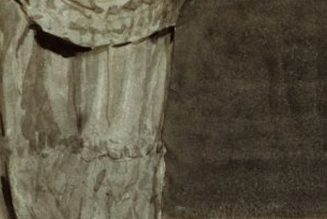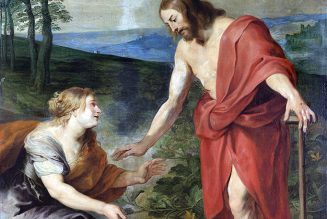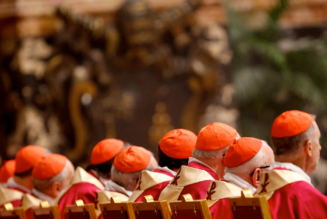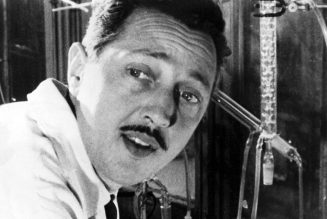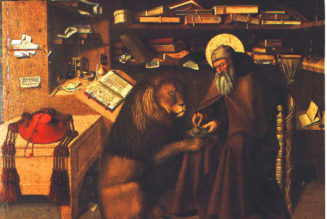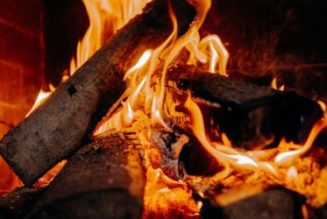
A new television miniseries premiering today on EWTN examines the question, “What am I supposed to do with my life?” both in terms of the big decisions that can determine life’s course and the smaller-but-no-less important daily choices in our lives as Catholics.
The Quest: The Voice of God Within is a new documentary-style series from the University of Dallas that runs as five 30-minute episodes Nov. 15-19 on the EWTN Global Catholic Television Network at 3:30pm Central, 4:30pm Eastern time. The series also will be available on demand through the EWTN streaming app.
Through interviews with the University of Dallas’ faculty and rich video, the series informs and probes questions of faith, purpose, conscience and the life of virtue using examples from literature, history, Scripture and the saints.
The series’ writer, director and narrator, Shannon Valenzuela, who is the University of Dallas’ content director for its Liberal Learning for Life program and an affiliated assistant professor of English, describes the project and its goals. This interview has been edited for length.
What is The Quest about?
The quest is five episodes detailing the Christian life from the point of discovering our purpose or rediscovering purpose and living it out with joyful courage, no matter the circumstances in which we might find ourselves. We do that by drawing on stories from literature, history, from Scripture, from the lives of the saints, in order to weave that picture, that narrative of living our purpose with joyful courage.
What is the format of the series?
It’s in a narrative format, not an academic lecture format. We wanted to have it feel conversational and story-like, to allow us to really explore that question of the narrative of the human life, walking through different examples. It’s not quite a documentary in the strict traditional sense, but it does have that feel, with the narrator and experts weighing in on these questions and different examples or exemplars that are woven throughout.
We are streaming the series on our web platform and running clips on social media.
Who is your target audience?
Our program, generally speaking, is aimed toward adults who are not really looking to go back to school but are nevertheless interested in continuing intellectual and spiritual formation. It’s really designed for people who are asking questions about their purpose of life. Perhaps they’re on a threshold of some sort. They’re wanting to reignite a passion for what they feel they’re called to do in this world or they’re asking questions about what God wants them to do, and they want help thinking through that. It could even be for high-school or college-age people who are reflecting on those questions as they step across that threshold into adulthood.
There are access points there for people who may be experiencing what the Catholic Church has to say for the first time or have questions about it or are just seeking to think more deeply about these questions.
What would you like viewers to take away from the series?
I think, for us, encouragement is a huge part of that. We really wanted to leave people with the sense that whatever God is calling them to do in this life, God will be faithful to that. Even though things seem to be so challenging and seem to be almost impossibly difficult, they can look back at these examples. All the different resources remind us of God’s faithfulness to the call that he is giving to us.
We talk a lot at the university about cross-curricular conversation around core ideas, these human questions about purpose, faith, etc. I think something, as well, that we hope comes through is the joy and the richness of the tradition we are all part of and the way in which all these disciplines can come together around a question and have a conversation that is so fruitful and yields such thoughtful responses.
What inspired The Quest, and how was it developed?
At the University of Dallas, we have a program called Liberal Learning for Life, where we’ve developed a video-course series that connects the academic work we do at the university with audiences outside the university. As one of the longer video series we developed, the third course is called “The Person: Action & Influence,” and it really goes into a lot of detail on how we make moral decisions. We come to understand things like virtue and right action in the world, offering witness to the world, helping others to come to right action, etc. When we had the opportunity to present the concept to EWTN, we went back to that slate, you might say, and narrowed in on this idea of the narrative journey of the human person from that moment of feeling called to some purpose and then what motivates us to live that out with courage. We had done extensive faculty interviews as part of that series, and as we went back, we were able to use some of those interviews, some of that material, and build it into this new format.
What does the series offer for the challenging times we’re facing?
We were building the longer-course series before COVID-19, before the world went through this very challenging time that we’re still in the midst of now. But it feels, in a way, that this has emerged at exactly the right time. There are so many people who are struggling or who had taken the time to ask those questions about where they are in life and what they’re doing and what God might be wanting them to do now or take up next, so it feels very appropriate, or it’s very providential in a way, that it seems to be hitting right where it’s needed perhaps.
Are there virtues you especially wanted viewers to think about?
We spend a bit of time in the first episode laying, in a sense, the groundwork for thinking about choice, action and decision-making, so prudence is a virtue that we try to unpack and explore. How does prudence help us to act rightly and understand what to do in the moment as we process what God is asking us to do? How do we translate that into the situations that we find ourselves in every day? The virtue of prudence is so instrumental there.
We spend a lot of time talking about love and friendship connected to love, and also the virtue of hope. Love is really the “through life” of the entire series, the grounding virtue. Hope is what allows us to move forward, and prudence helps us to translate into daily action the larger sense of purpose.
You tell the stories of two World War II martyrs. Are you inviting Catholics to think more seriously about martyrdom, both white and red?
Courage is also a primary focus of the series. In a sense, thinking through or being courageous in the face of even the possibility that it might ask you to give everything is a serious consideration we invite people to think about. Also paired with that, thinking about those smaller decisions, not necessarily waiting for the big moment where you might be asked to do the really big thing, and that’s where you’re going to respond with courage, love, hope and other virtues.
But also reflecting on those small moments. I’m thinking about St. Thérèse [of Lisieux] and the “Little Way,” of the small moment, the small daily acts of courage that we’re called to — not losing sight of either end of the spectrum. It may not be necessarily giving your life, but it may be sacrificing a lot. That’s where I think maybe people need that encouragement — like it’s possible, God will be faithful.
Do you have a personal connection to the series?
In order for it to be genuine, you have to write from your own heart and experience, so many of the messages I feel come through, about courage, about having faith and confidence in God. In a way every writer writes for themself first. I think there is a personal connection there, in the sense that I have personally walked through times where I’ve struggled to have courage; I’ve had struggles making those decisions. I think it was so helpful to me to be involved in this project and to have the opportunity myself to reflect on what it means to get clarity on what I feel God is calling me to do: Am I going to walk that with courage? It is personal, in many ways, and I feel that it was a message that I needed to hear as much as anyone in the audience perhaps needs to hear or is hoping to hear.
Join Our Telegram Group : Salvation & Prosperity


